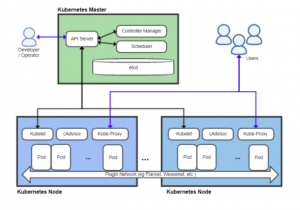Tag Archives: Kubernetes
Quick Glance at Kubernetes Architectural Building Blocks

This blog represents information on some of the key architectural building blocks of Kubernetes. The greater details on Kubernetes architecture can be found on this page, Kubernetes Architecture. Following diagram represents technology architecture (with infrastructure) viewpoint of Kubernetes: Following is another viewpoint of the Kubernetes technology architecture: Pay attention to some of the following as per above diagrams: Kubernetes Master Controller Manager (kube-controller-manager): It is a daemon process that embeds the core control loops, a non-terminating loop, for regulating the state of the system. A control loop can also be seen as a controller. Details can be found on this page, kube-controller-manager. Controller manager supports different types of controllers such …
Kubernetes – How to Install Kubernetes on Ubuntu (Linux)
This blog represents steps/instructions on how to setup Kubernetes on Ubuntu (Linux) using Minikube. The instructions have been used to setup Kubernetes on Ubuntu 16.04. Following are key steps which need to be taken in order to setup and get started with Kubernetes: Ensure Virtualization Technology (VT) is enabled in BIOS Install VirtualBox and VBoxManage Install KubeCtl Install Minikube Launch Kubernetes cluster Ensure Virtualization Technology is Enabled in BIOS Setup First and foremost, ensure that Virtualization Technology (VT) is enabled in BIOS setup. In order to do that, do following: Shutdown the system and restart. Keep tapping ESC key when starting the machine. This would bring up the startup screen …
Dockers Containers only to shine more with Kubernetes
A year back, I got started with Dockers Containers. 2-3 months down the road and I realized that thankfully I learnt a revolutionary technology because of some of the following reasons: Quick Learning: Docker containers were used to spin up my exploratory learning environment, on-demand demand, for any tool/ framework/Programming language I wanted to learn On-demand Self-service Environments: Docker containers were used to setup on-demand self-service dev/test environments. This was a huge productivity booster for developers and test engineers. Automated Deployments: With Docker containers, Jenkins, Repository etc, I saw the automated deployments getting created in dev/testing/UAT servers. Following are some of the areas where I felt the need for some …

I found it very helpful. However the differences are not too understandable for me